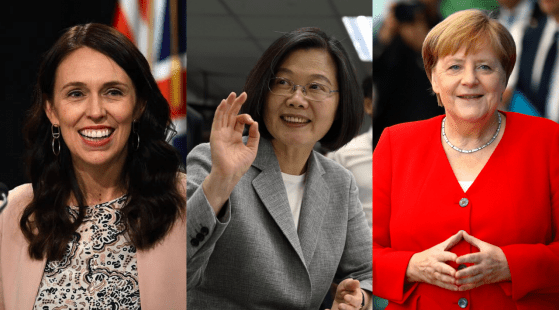After a photo of the White House’s initially all-male Coronavirus Taskforce was released on Twitter in late February, one user very accurately noted that it looked like “we had a #mandemic on our hands.” This may be the perfect word to describe the set of political circumstances and the impact of the global emergency we now face. As the COVID-19 crisis has progressed, it’s become more and more clear that the effects of the novel virus have set the progress of women and girls back far. And to ignore the role of gender in this situation would be doing more than one half of the population a disservice. As the seriousness of the pandemic has finally sunk in, women leaders around the world have taken center stage—sadly, it seems the United States has been late to the game. Countries with women leaders, such as Germany, Taiwan, and New Zealand, have put up the strongest fight against COVID-19.
In the chaos of the current pandemic, nations with women in leadership have been a beacon of hope when it comes to containing the virus. Germany, whose prime minister is quantum chemist Angela Merkel, has seen COVID-19 cases in the hundreds of thousands—yet has had some of the lowest mortality rates. Experts attribute this to “early and widespread testing and treatment, plenty of intensive care beds, and a trusted government whose social distancing guidelines are widely observed.”
The same goes for New Zealand, which has only had one death and reports dwindling infection numbers. Not only has the country’s prime minister Jacinda Arden been praised for her “clarity and compassion” during such confusing and stressful times, but she has even gone so far as to hold a press conference specifically for children to lessen anxiety and answer questions like how kids can help to keep grandparents safe.
Taiwan, led by the country’s first woman president Tsai Ing-Wen, has had one of the most successful responses to the healthcare emergency. In spite of being geographically closer to China where the virus first appeared, Taiwan has maintained relatively low infection rates and has even been so well-prepared that the country has pledged to donate 10 million face masks to countries in need.
In the United States, women in local leadership positions have emerged as visionary in their response to the crisis. San Francisco Mayor London Breed acted in concert with Oakland Mayor Libby Schaaf and five other local municipalities to declare the country’s first major metropolitan area shelter in place order, which took effect on March 17th and is now being credited by some as helping to flatten California’s curve. Chicago Mayor Lori Lightfoot has gone viral for her administration’s innovative communications tactics to urge citizens to stay home, while addressing critical issues of housing COVID-19 patients in shuttered hospitals and unused hotel rooms. These women leaders are just a few of the many women across the United States leading with compassion and courage in the crisis.
Women in politics aren’t the only ones in the battle to stop corona—women leading in healthcare are getting their due recognition as well. Sure, Dr. Anthony Fauci may have been dubbed “America’s doctor,” but women like Dr. Deborah Birx and Seema Verma are notable in public safety, though they have yet to become household names. Conversely, the women chief medical officers have become the face of the COVID-19 defense in Canada. Leaders like Dr. Deena Hinshaw, Dr. Theresa Tam, Dr. Bonnie Henry and Dr. Eileen de Villa have become known as the country’s “sheroes”—receiving murals, t-shirts, and fan clubs in their honor. “They represent something that now other women can aspire to, and young girls for that matter.”
These women’s exceptional work and contributions in addressing the pandemic is no coincidence. In spite of the stereotypes and misogyny that claim women are too emotional, inexperienced, or just simply unfit to lead—the proof is in the pudding. Attentive, effective, and proactive leadership is what it’s going to take for our lives to return back to normal—and women in power are providing just that.
Take Action! With women severely underrepresented in positions of power, don’t buy into the myth that women can’t be exceptional leaders. In such critical times, let’s celebrate and take inspiration from these amazing women that are fighting to keep our world safe.




